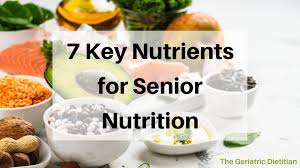1. Why Nutrition Matters More Now Than Ever
You've probably heard the saying, "You are what you eat." Well, there's a lot of truth to that! The food we consume directly impacts our health, energy levels, and overall well-being. Especially now, as your body needs all the right nutrients to keep you active, sharp, and feeling your best.2. The Building Blocks of a Nutritious Plate
Caloric Needs: As we age, our metabolism slows down, meaning we might not need as many calories as we once did. However, the need for essential nutrients remains the same or even increases. It's essential to focus on nutrient-dense foods that provide the vitamins and minerals you need without excess calories.
Proteins: Think of these as the building blocks for your muscles. Muscle mass tends to decrease with age, leading to weakness and reduced mobility. To combat this, seniors often require more protein. Include lean meats, fish, eggs, dairy, beans, and lentils in your diet.Aim for a palm-sized portion at each meal.Whole Grains: These are your energy providers. Swap out white bread and pasta for whole grain versions like brown rice, quinoa, and whole wheat bread. They release energy slowly, keeping you full and energized for longer. Fiber: With age, our digestive system slows down. Consuming fiber-rich foods like whole grains, fruits, and vegetables can help promote healthy digestion and prevent constipation.
Fruits & Veggies: These colorful delights are packed with vitamins and minerals. Try to fill half your plate with a rainbow of fruits and vegetables. The more colors, the better!
Dairy or Alternatives: Calcium is crucial for strong bones. Include milk, yogurt, or alternatives like almond or soy milk in your diet. Calcium and Vitamin D: Bone density declines as we age, increasing the risk of fractures. Ensure you're getting enough calcium from dairy products, fortified foods, or leafy greens. Vitamin D helps the body absorb calcium, so don't forget to soak up some sun and eat vitamin D-rich foods like fatty fish and fortified cereals.
Healthy Fats: Not all fats are bad! Avocado, nuts, seeds, and olive oil are excellent sources of healthy fats that support brain health and keep your joints lubricated.
Vitamin B12: Some seniors may have difficulty absorbing this vitamin, which is crucial for nerve function. Ensure you're eating B12-rich foods like fish, meat, poultry, eggs, and fortified cereals.
3. Hydration is Key
Water is essential for every cell in your body. Aim for 8 glasses a day. If plain water isn't your cup of tea, try herbal teas or infuse your water with slices of fruits for a refreshing twist. Our sense of thirst diminishes as we age, making it easy to forget to drink water. However, staying hydrated is crucial for digestion, skin health, and energy levels.
3. Hydration is Key
Water is essential for every cell in your body. Aim for 8 glasses a day. If plain water isn't your cup of tea, try herbal teas or infuse your water with slices of fruits for a refreshing twist. Our sense of thirst diminishes as we age, making it easy to forget to drink water. However, staying hydrated is crucial for digestion, skin health, and energy levels.4. Limiting the Not-So-Good Stuff
It's okay to indulge occasionally, but try to limit sugary snacks, sodas, and too much caffeine. These can leave you feeling sluggish and can have long-term effects on your health.5. Listen to Your Body
Always remember, everyone's body is different. What works for one person might not work for another. Pay attention to how different foods make you feel and adjust accordingly.Adjusting Nutrition Based on Health Changes
Heart Health: If you're concerned about heart health, focus on eating omega-3 rich foods like salmon, walnuts, and flaxseeds. Limit saturated fats and sodium.
Diabetes: Balance is key. Focus on complex carbohydrates like whole grains, and pair them with protein to stabilize blood sugar levels.
Arthritis: Omega-3s can also help reduce inflammation. Turmeric and ginger are natural anti-inflammatories that can be added to meals.
Cognitive Health: Foods rich in antioxidants, like blueberries, spinach, and nuts, can support brain health. Omega-3 fatty acids are also beneficial for cognitive function.
Heart Health: If you're concerned about heart health, focus on eating omega-3 rich foods like salmon, walnuts, and flaxseeds. Limit saturated fats and sodium.
Diabetes: Balance is key. Focus on complex carbohydrates like whole grains, and pair them with protein to stabilize blood sugar levels.
Arthritis: Omega-3s can also help reduce inflammation. Turmeric and ginger are natural anti-inflammatories that can be added to meals.
Cognitive Health: Foods rich in antioxidants, like blueberries, spinach, and nuts, can support brain health. Omega-3 fatty acids are also beneficial for cognitive function.
The Power of Supplements
While it's best to get nutrients from food, sometimes supplements can help fill the gaps. Consult with a healthcare professional before starting any new supplements.
With only a few tweaks and a sprinkle of determination, you can transform your plate and, in turn, your health. Remember, every meal is a new opportunity to nourish your body.
And remember, if hunger is an issue for you due to depleted income, always reach out to local senior resources. Meals on Wheels, food pantries, senior citizen centers, food kitchens all make it a priority to provide nutritious, filling meals to the seniors in need. Do not be ashamed to use their services; that is what they were designed to do.
Resources:
While it's best to get nutrients from food, sometimes supplements can help fill the gaps. Consult with a healthcare professional before starting any new supplements.
With only a few tweaks and a sprinkle of determination, you can transform your plate and, in turn, your health. Remember, every meal is a new opportunity to nourish your body.
And remember, if hunger is an issue for you due to depleted income, always reach out to local senior resources. Meals on Wheels, food pantries, senior citizen centers, food kitchens all make it a priority to provide nutritious, filling meals to the seniors in need. Do not be ashamed to use their services; that is what they were designed to do.
Resources:
Meals on Wheels America
Feeding America
National Council on Aging
Nutrition.gov
Here is an article that lists other resources: Senior Hunger Statistics in 2023
Feeding America
National Council on Aging
Nutrition.gov
Here is an article that lists other resources: Senior Hunger Statistics in 2023








